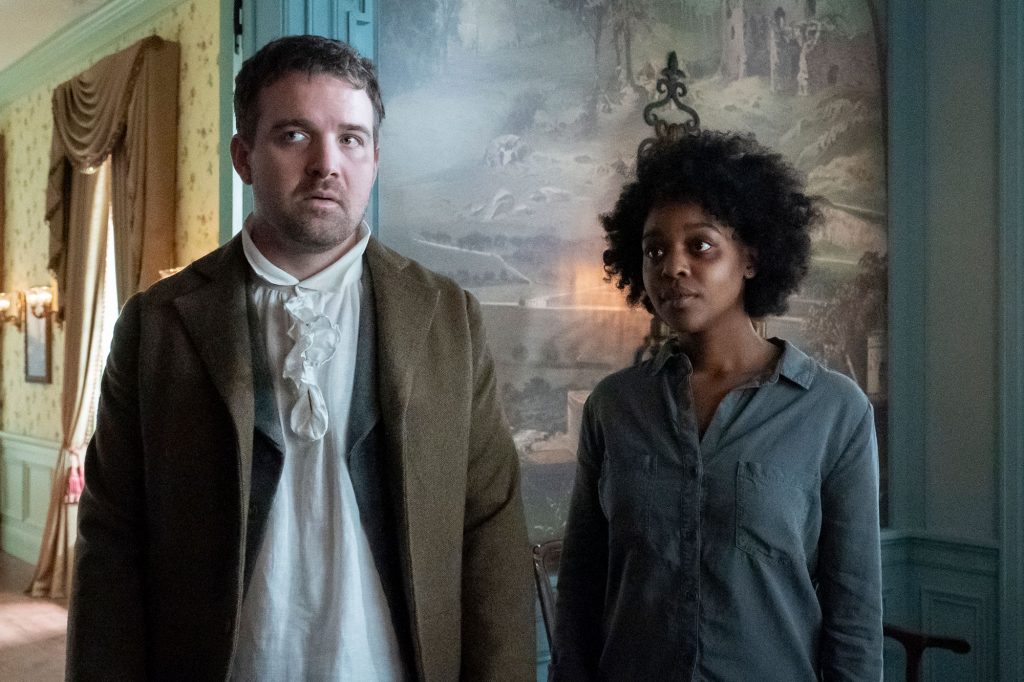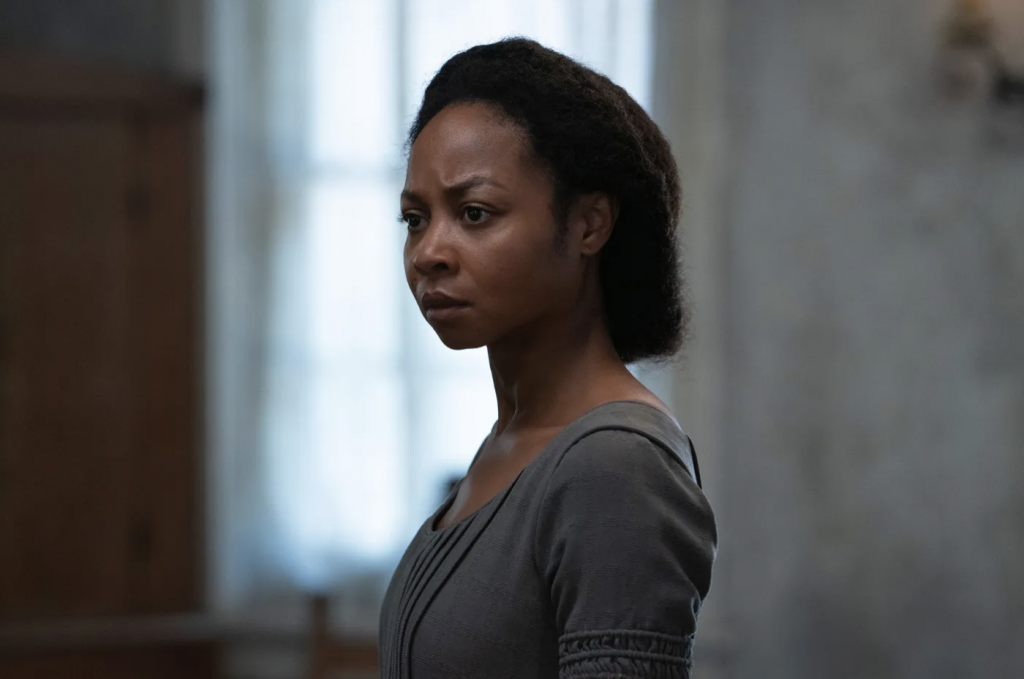The first TV adaptation of Octavia Butler’s seminal fiction had a deservedly quiet premiere at the close of 2022. As the first Black female author to prosper in science fiction, Butler was a trailblazer for diversity in the genre. Stories like Kindred, an insular narrative guided by time travel, analyze the kinship between America’s cruel past and present. Due to the novel’s sustained social relevance, it was only a matter of time before someone accepted the challenge to present Butler’s whip-smart work to new audiences. However, Hulu’s series adaptation of “Kindred” is a sloppy interpretation of ingenuity. Butler’s imaginative fiction becomes dampened by graceless revisions and clumsy direction.
Kindred, the series, is a propulsive chronicle of a young Black woman’s involuntary time travel from contemporary Los Angeles to an early 19th-century plantation. We find Dana (Mallori Johnson) just as she moves to LA with the dream of becoming a television writer. During a one-night stand with a restaurant waiter, she teleports to an unfamiliar home where she saves a boy named Rufus (David Alexander Kaplan) in the first of several chilling excursions. Across eight episodes, we follow her on a breakneck journey through family conflict, romance, and confrontation with a dark American history.

Despite a compelling premise, Kindred’s vision of the past is void of depth. Its old-world backdrop is a stage overflowing with brash yet hollow performances. Intangible characters paired with a notable lack of interpersonal conflict and violence contribute to an uncomfortably mellow tone. In Episode 6, Dana smiles when her white companion claims, “It’s kinda like a retreat.” Watching the pair trivialize such a notably vicious era in human history is exasperating. Sympathy also feels inaccessible when Dana minimizes the undeniable misery of her experiences in the South. Only rarely does she show discomfort beyond a level of mild irritation. Down to its penultimate episode, Kindred softly suggests that maybe life on plantations wasn’t so bad. I can understand the impulse to shy away from the reality of slavery. A dismissive attitude towards any media depicting Black hardship has blazoned the Black community in recent years. In response to real-life adversities, many viewers have expressed fatigue with Black slavery media. It’s possible that Kindred’s sanitized portrayal of the Antebellum South is a timid reaction to these sentiments. But at what point does such polishing become historically revisionist?
No characters experiencing slavery are provided even a modicum of individuality until more than halfway through the season. The dialogue is simple and aimless. Rather than a passage through time, it feels as though Dana is travelling to a low-budget movie set. I regret the utter gutlessness of this adaptation. There is so much lost in the refusal to engage with the truth of the period. Removing realism from Black trauma stories does more than soften discomfort; it cultivates a dangerous form of erasure through dehumanization. Enslaved people had full personal histories, motivations, and identities, despite their circumstances. Butler brought her community into science fiction with all of their beauty and blunders, imbuing her novels with endless nuance and understanding. Conversely, this adaptation refuses to develop characters where Butler offered illustrative portraits. If these are the slave stories we’re served with, then let me join the chorus: “No more Black trauma movies!” All Black characters deserve to be painted in colour. Anything else will only work against us.
In like manner, the show’s villains lack any nuance for interpretation. Tom Weylin (Ryan Kwanten) plays the cruel patriarch to a histrionic Margaret (Gayle Rankin) and an all-too-innocent young Rufus. Of course, these are the same outlines of the novel’s Weylin family. However, Butler paints each Weylin with a finesse unparalleled by the show. More than a wide-eyed child, the original Rufus is a manipulative player who exploits his power to no end. More than melodramatic, Butler’s Margaret Weylin is an anguished White woman who uses her power to cope with racial violence. The show makes a sloppy attempt to execute a similar critique of White tears by featuring a neighbourhood Karen in its 2016 setting. This plotline is tactless, callow, and deeply unfunny in all of its theatrics. It exemplifies one of the show’s greatest faults: cowardice. At every turn, Kindred refuses to be radical. Instead of depicting the Weylins’ complexity, the show portrays Tom and Margaret as prosaic villains.

Poor characterization unfortunately extends to the main character of the series. Dana James leads us through eight episodes of a whirlwind undertaking with a strange passivity. Butler ingrains her original protagonist with a strong will, intelligence, and integrity. Accordingly, her strained yet nurturing relationship with Rufus is the product of a well-reasoned decision. But shoddy writing and direction in this adaptation form a robot where we need a heroine. Every time Dana saves Rufus, it feels like she’s moving under a spell. Her internal dialogue is scarcely and crudely translated from the novel, wherein it illuminates her central traits. Here, we’re often left in the dark regarding her logic and intentions. In effect, Dana’s interactions with Rufus lack motive. I found myself at a loss wondering why she continued to help him. At one point, she inexplicably runs toward the plantation in search of him, heedless of her well-being. Unlike her predecessor, Kindred’s leading figure acts without reason, as if she’s bound by invisible restraints.
What’s more, her emotional responses are bewildering. She is rightfully distressed by her plight in her modern setting. Her later scenes in this period feature the best performances by Mallori Johnson in the whole series. But, back in the South, Dana is lifeless. She lacks unease for longer than can be attributed to shock. She takes minimal action to improve her situation or that of her peers. In yet another misstep, Kindred fails to give Dana sufficient story to stretch through the season. It takes three episodes for her to think of making a simple bag of supplies for her trips. In the South, she puts no thought towards a plan. A bizarre revision appoints Kevin, her white romantic interest, as the main strategist for her survival. This choice baffles me, as the novel sees Dana continually sacrificing herself to improve the world around her. Here, she is frustratingly naive, unmotivated, and passive. She is never angry. She has no urge for rebellion. The mishandling of Dana’s character renders the majority of the series wholly unproductive.
The tension between Dana and the world around her finally blooms in the last two episodes of the season. They are the most compelling chapters by far. The distance between Kevin and Dana grows wider. Her resignation begins to transform into indignation. A powerful conflict between two enslaved characters finally starts to distinguish them as individuals. Yet these highlights fail to compensate for Kindred’s lack of skillful direction across the board. The show yearned to be smart and refreshing, though many of its choices were deeply ineffectual. But, despite the slog which preceded it, the final episode manages to create potential for a compelling second season separate from Butler’s matchless novel.
